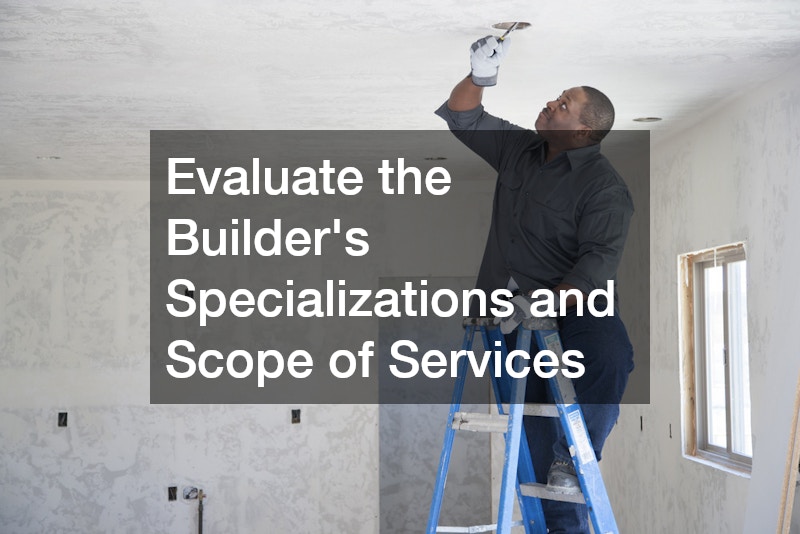Embarking on the journey of building a new home is both an exciting and daunting endeavor. Your home isn’t just a structure—it’s a personal sanctuary, a place of comfort, a cherished haven where memories will be created and nurtured over time. Given the significant emotional and financial investment, selecting the right home builders is crucial. The right builder will not only bring your vision to life but also ensure your project runs smoothly, adheres to your budget, and stands as a testament to quality craftsmanship for years to come.
In this extensive guide, we’ll delve into key considerations when choosing a home building partner. From assessing their credentials and reputation to understanding their specialization and project management capabilities, we’ll explore strategies to find a builder who meets your unique needs. We’ll also touch on related services—such as landscaping, finishes, and mechanical systems—to highlight how a top-tier builder often coordinates with various specialists, from local tree nurseries to roofing contractors, ensuring your dream home is constructed to the highest standard.
Define Your Needs and Vision
Before you even start looking for home builders, it’s essential to define your needs, preferences, and overall vision. Consider the architectural style you desire, the functionality of your floor plan, and the level of customization needed. Think about the size of your property, where the structure will sit, and how the exterior will blend with surrounding landscapes. Do you imagine a spacious, open-concept living area that seamlessly connects to the outdoors, or would you prefer more segmented, traditional rooms?
Additionally, determine your budget and timeframe. Are you willing to invest in premium materials that may stand the test of time, or do you need to keep costs down? Remember, your prospective builder will use the information you provide to guide their recommendations, from working with local tree nurseries for harmonious landscaping to coordinating with a kitchen remodeling specialist if you plan to merge building a new home with upgrading an existing kitchen space. The clearer your vision, the easier it will be to find a builder suited to turn it into reality.
Research the Builder’s Credentials and Experience
When selecting a home building business, their track record is one of the most telling indicators of quality. Check whether they possess the necessary licenses and certifications required in your region. Licensing ensures the builder follows regulated standards in construction quality, safety, and building codes. Memberships in reputable industry associations can also signal a firm’s credibility and commitment to ongoing professional development.
Additionally, evaluate how long the business has been operating. A company that has weathered multiple economic cycles often has better financial stability, a stronger supplier network, and refined project management processes. Experience also means a better ability to handle challenges such as environmental constraints, difficult terrain, or integrating specialized finishes, like working seamlessly with a hardwood flooring company to ensure top-quality flooring installation. The longevity and stability of a builder can thus be a strong green light.
Review Portfolios and Past Projects
A home building business often showcases its work through portfolios—photographs, blueprints, and even 3D virtual tours. Analyzing their portfolio gives you insight into their aesthetic sensibilities, range of design styles, and the quality of their craftsmanship. Some builders specialize in modern, minimalist designs, while others excel in traditional styles or luxury estates.
If you can, arrange to see some completed projects in person. Walk through show homes or neighborhoods where they’ve built multiple properties. Pay attention to details like the quality of the fixtures, the smoothness of the finishes, and the structural integrity. This is also a good time to learn about their partnerships with other companies. For instance, check if they have established relationships with a tree care services provider or a HVAC company for heating and cooling systems. A builder that collaborates with reputable specialists often delivers a more cohesive, polished final product.
Ask for References and Testimonials
A reliable home building business should be able to provide references from previous clients. Speaking directly with homeowners who have already gone through the building process can offer invaluable insights. Ask about their overall experience: Did the builder stick to the agreed-upon timeline and budget? Were there any unexpected hurdles, and how were they managed? How responsive was the builder to questions, concerns, or changes requested along the way?
Testimonials and online reviews on platforms like Houzz, Google Reviews, or social media can also help gauge the company’s reliability. Keep an eye out for repeated patterns—both positive and negative. If multiple reviewers praise the builder’s transparency and attention to detail, that’s a strong indicator you might be on the right track. Conversely, recurring complaints about poor communication or subpar craftsmanship should give you pause.
Evaluate the Builder’s Specializations and Scope of Services
Different builders have different niches. Some may specialize in turnkey home construction, handling everything from foundation-laying to finishing touches like coordinating with exterior painting companies. Others may focus more on niche markets, such as custom luxury estates or sustainable eco-homes.
If you foresee your home needing specific features—like integrated smart systems, energy-efficient appliances, or special exterior enhancements—choose a builder whose expertise aligns with these requirements. If you know you’ll need specialized interior services, the right builder might also work hand-in-hand with a local house contractor known for fine interior details, or a team offering remodeling services to adapt existing structures on your property. Similarly, if you plan to have elaborate garden landscaping, the builder might have relationships with local tree nurseries that can help you choose the right trees, shrubs, and plantings that complement your home’s style and climate conditions.
Understanding the Planning and Design Process
A reputable home builders will likely guide you through a structured planning and design process. This typically begins with an initial consultation to discuss your vision, followed by a feasibility study where the builder assesses your land, budget, and local regulations. They should provide you with conceptual designs, preliminary cost estimates, and possibly even 3D renderings so you can visualize how the final home will look.
During the design phase, ask how flexible they are when you request changes. Homebuilding often involves multiple iterations before the design is finalized. A good builder is patient, communicates clearly, and can adapt plans as your ideas evolve. Also, inquire about the selection of materials and finishes—do they have an established network of quality suppliers, from roofing contractors for your roof structure to a water heater installation specialist for essential home utilities? A builder’s ability to coordinate and manage various trades and suppliers is a hallmark of their professionalism.
Transparency in Cost Estimates and Contracts
One of the most challenging aspects of building a home is ensuring the project stays within budget. A reputable home building business should provide a transparent, itemized cost estimate and a clearly defined contract. The estimate should detail labor, materials, permits, design fees, and any other charges. If something seems unclear, don’t hesitate to ask for clarification. Vague estimates can lead to unpleasant surprises down the line.
Additionally, ensure the contract includes a payment schedule tied to completed milestones rather than just dates on a calendar. This incentivizes the builder to stay on schedule. Look out for clauses covering delays, cost overruns, and dispute resolution. The more comprehensive and transparent the contract, the less room there will be for misunderstandings.
Communication and Project Management Practices
Effective communication is vital for a successful building project. You want a home building business that keeps you informed at every stage. Will you have a dedicated project manager or point of contact? How often can you expect progress updates, and through what channels—email, phone calls, or site visits? A good builder should welcome your involvement and make you feel confident about the progress.
Building a home involves many moving parts—architects, engineers, material suppliers, subcontractors like a hardwood flooring company or exterior painting companies—and coordinating all of them is a complex dance. Skilled project management ensures everyone works together cohesively and the project stays on track. It also involves handling permits, inspections, and adherence to local building codes. Strong organizational systems, scheduling tools, and open communication lines help ensure a smoother building process and reduce the likelihood of errors or miscommunications.
Quality Assurance and Warranties
Quality assurance shouldn’t be an afterthought; it should be ingrained into a builder’s process. Ask prospective builders how they ensure quality at each stage—do they conduct regular inspections? Do they follow industry best practices and use durable, high-quality materials?
Inquiring about warranties is also critical. A reputable home building business should stand behind its work. Typically, builders offer different types of warranties—structural warranties that cover load-bearing aspects of the home for a set number of years, and workmanship warranties covering issues like plumbing and electrical work for a shorter period. Some builders may also facilitate connections to third-party service providers, like a HVAC company, to handle system maintenance and warranty claims. Understanding what is covered and for how long can save you future stress and expense.
Consider Energy Efficiency and Sustainability
More than ever, homeowners are considering sustainability in their building choices. If environmental responsibility is important to you, look for a home building business that incorporates eco-friendly practices. This could mean integrating energy-efficient windows, insulation, and appliances, or working with suppliers who source sustainable materials. Ask if the builder is familiar with green certification programs like LEED or Energy Star and if they have experience installing solar panels or rainwater harvesting systems.
You might also consider how the builder integrates the home into its surrounding environment. For instance, they may recommend working with tree care services to preserve mature trees on your property, or suggest planting new trees and shrubs from local tree nurseries to enhance the home’s aesthetics and reduce energy costs by providing natural shade. A sustainable building approach can yield long-term savings, improved indoor air quality, and a reduced environmental footprint.
Balancing Aesthetics and Practicality
Building a home isn’t solely about visual appeal—it must also function effectively for your family’s daily life. Good builders balance beauty and practicality. They ensure that your floor plan encourages easy movement, offers sufficient storage, and accommodates future modifications.
For example, if you anticipate a need for remodeling services down the line—maybe you’ll finish a basement or convert a guest room into a home office—you want a builder who thinks ahead. Will the structure’s layout and infrastructure simplify later changes? If you’re installing specialty systems like a tankless water heater, does the builder collaborate with a water heater installation expert to optimize placement and ensure seamless future maintenance? These considerations can save you time, money, and headaches down the road.
Look Into Their Network of Specialists and Subcontractors
A top-quality home building business often has an extensive network of specialists to ensure every component of your home meets high standards. Building a home is like assembling a puzzle—no single builder can do it all. The best ones know how to find the perfect piece for every puzzle slot.
Consider the range of subcontractors they commonly work with. They may have long-standing relationships with roofing contractors, ensuring that your roof is not just structurally sound but also aesthetically pleasing and energy-efficient. They may have a go-to HVAC company to design and install reliable heating and cooling systems. Or perhaps they maintain a good rapport with exterior painting companies that consistently deliver professional, lasting finishes. These trusted partnerships can expedite the construction process and result in a higher-quality final product.
The Role of Local Market Knowledge
A builder who understands the local market is better positioned to handle region-specific challenges. Different climates, soil conditions, and municipal building codes require specialized knowledge. A home building business that has been operating in your area for a while likely knows how to navigate local permitting processes, work with local inspectors, and choose materials that withstand the local climate.
For example, if you live in an area with plenty of old-growth trees, the builder may know the best local tree nurseries for sourcing complementary greenery and how to integrate these natural elements into your landscape. This localized approach can save time, reduce costs, and ensure your home is suited to its environment, improving its long-term durability and value.
Comparing Large Firms vs. Small Builders
When choosing your home building business, you might debate between a large, established firm and a smaller, more personalized operation. Bigger companies may have more extensive portfolios, sophisticated project management tools, and strong relationships with a wide range of suppliers. Smaller builders, on the other hand, might offer more individualized attention, flexibility, and a personal touch, functioning similarly to a local house contractor who knows the community intimately.
The right choice depends on your priorities. If you want to ensure robust project oversight with multiple checks and balances, a larger firm may suit you. If you prefer a close, collaborative relationship where you can easily discuss ideas with the company owner, a smaller builder might be the way to go. Evaluate what matters most to you—personal interaction, speed, cost-effectiveness, or breadth of services—and choose a builder accordingly.
Selecting the right home building business is a multifaceted process. It requires careful reflection on your goals, extensive research into a builder’s background and reputation, and a thorough examination of their capabilities, communication style, and network of trusted specialists. By considering your needs upfront, verifying credentials, speaking with references, and comparing proposals, you can find a partner who will bring your vision to life with skill and dedication.
Your home is more than a collection of walls and a roof—it’s the backdrop to your life’s most important moments. Whether coordinating with local tree nurseries to create a serene garden oasis, or managing a spectrum of skilled trades from roofing contractors to exterior painting companies, the best builder ensures your home is crafted with care, expertise, and respect for your dreams.
Building a home is a journey filled with decisions, and choosing the right home building business is among the most critical. Approach this choice thoughtfully, and you’ll be well on your way to enjoying a custom-built environment that reflects who you are and how you aspire to live.




